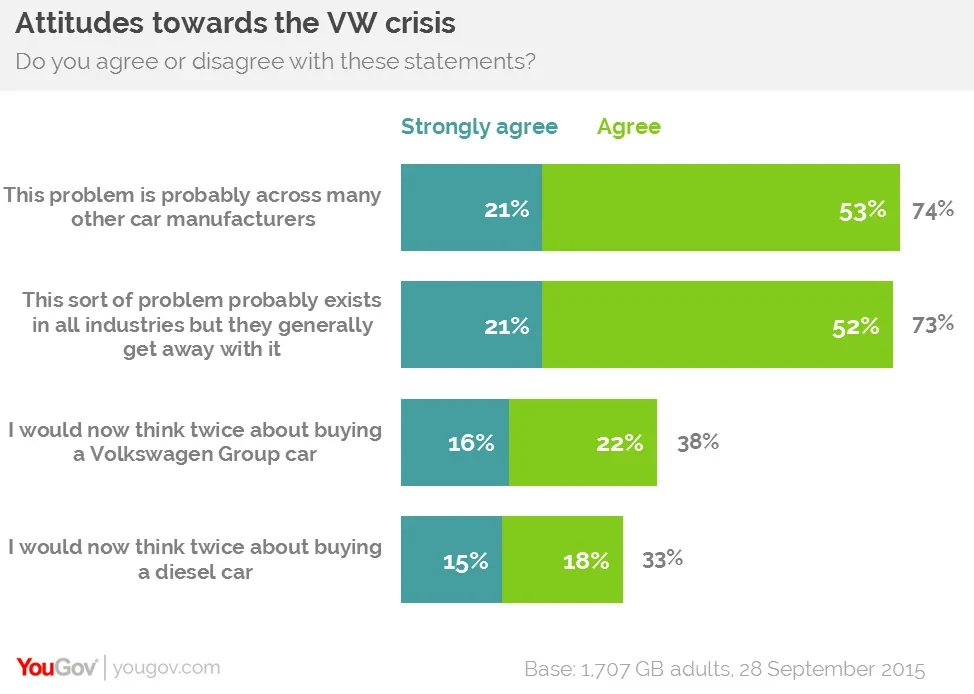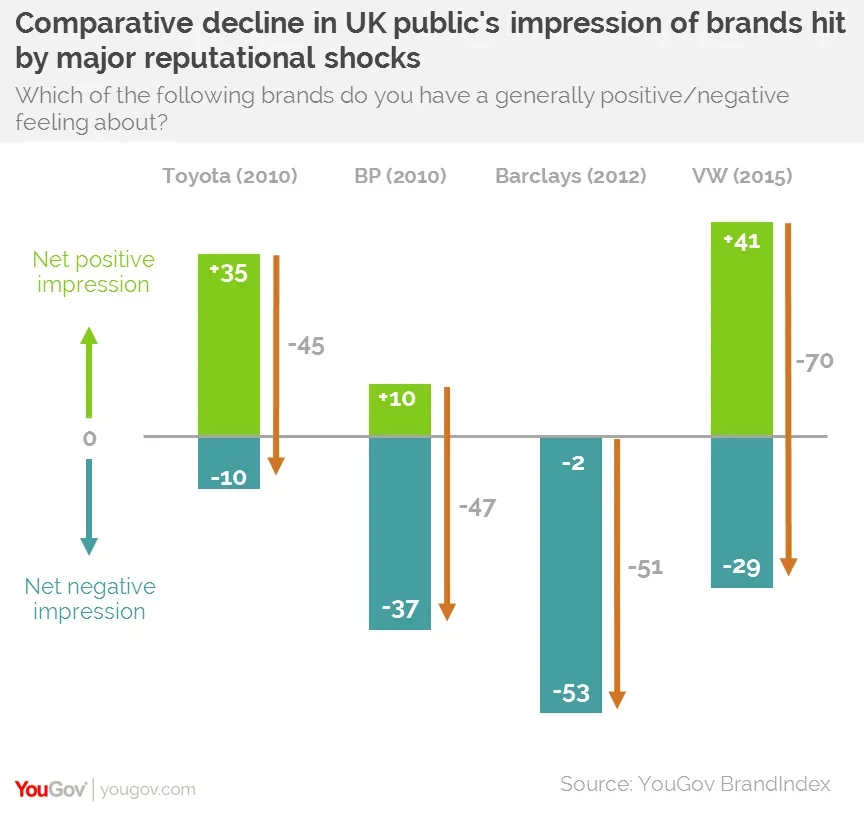Public worries about big business are being compounded and three quarters think business is getting away with it
The unfolding story at Volkswagen will doubtless damage the UK’s number one major car brand in many different ways, but it is the damage to wider public confidence in corporate activity that all businesses should be worried about.
As someone who spends most of his working hours measuring how deeply events impact attitudes, the current Volkswagen problems provide me with another opportunity to watch a corporate shock unfold while quantifying the damage. There should be no sense of schadenfreude here though. YouGov data shows that Volkswagen was one of the most positively viewed brands in the UK, and the leader in its sector, but its lack of honesty over emissions has negative consequences for all businesses.
Breaking the rules in this way is certainly a problem that people care about. A recent YouGov poll in the UK shows that almost half (47%) of the public say the crisis is something they are concerned about while almost two thirds (61%) say they are surprised that a company like Volkswagen has been caught up in a scandal like this.
However if we take a step back, the UK public doesn’t hold business in very high regard anyway when it comes to telling the truth. YouGov data from January this year shows that only a third of the public (34%) trust business leaders when they are talking about their own company while almost half (47%) mistrust them.
The public’s trust is no higher when business leaders talk about other issues such as the EU, immigration, taxation, or employment regulations. Indeed, over the past 12 years when we have asked the public how much they trust ‘people who run large companies’ the score peaked at 28% in 2010. When YouGov’s regular Trust Tracker measured it at again this month it had fallen to 23% - a similar figure to ‘leading Conservative/Labour politicians’.
Our post-crisis polling on VW in the UK also throws up further causes for concern. Three quarters of people (74%) believe ‘this problem is probably across many other car manufacturers’ – just 9% expect it is restricted just to the Volkswagen Group. A third (33%) say they will now think twice about buying a diesel car, and 38% will think twice about buying a Volkswagen.

The really concerning figure though is that three quarters (73%) say that ‘this sort of problem probably exists in all big industries but they generally get away with it’, a terrible indictment of the level of trust between big business and the British public. Even amongst those in our sample that work in large businesses we find agreement with this statement is just as high. Younger people are slightly less likely to agree but there seems to be little political bias with Conservative and Labour voters being just as likely to think the problem is relatively widespread.
Volkswagen though has enjoyed higher levels of favourability amongst the UK public than most brands, indeed it has been held in high esteem, above that of every other major car brand and ahead of its German rivals Mercedes-Benz and BMW. We know this thanks to the fact that every day, YouGov’s BrandIndex tool measures, amongst other things, the general impression that people have about over 1,000 individual brands. Over the past year VW has been in the top 40 brands we measure, above every other car brand.
Prior to the Volkswagen news breaking, the brand enjoyed an impression score of about +40, compared with a mean across UK brands of +11. This is a net score showing the difference between the proportion of the public with a positive ‘general feeling’ towards the brand versus those with a negative view. Three weeks into the scandal and that impression score has stopped falling, as have many of the other scores BrandIndex collects, such as value, quality, consideration, and recommendation, but the damage has been severe. On a one-week rolling basis the impression score has dropped from +41 to a low of -29, a massive fall of 70 points.
Putting this drop into context, Toyota’s recall crisis of 2010 saw a drop in brand impression of 45 points (to a low of -10), BP’s general impression score during the 2010 Deepwater Horizon disaster fell 47 points bottoming out at -37, while Barclays saw its score drop 51 points through the Libor crisis to -53. Worryingly for VW, none of these three have consistently made it back to their pre-crises levels.

So while the share price collapse may have initially been a reaction to the threat of legal costs in the US, the brand itself is being hit hard amongst UK consumers. We also see similar patterns in the BrandIndex data in other important markets including the US, Germany, Nordics and France in terms of serious drops in attitudinal scores.
Large business needs a public mandate in order to operate and a level of trust to ensure fair regulation. But companies have great responsibility to society at large and the risks of breaking that social contract are very great. Clearly that mandate is under pressure and the public will also want reassurance that someone is working on their behalf to check under the bonnet of all industries.
This article originally appeared on The Drum
Click here for full public attitudes results
More information about YouGov's Reputation research
Image from PA






